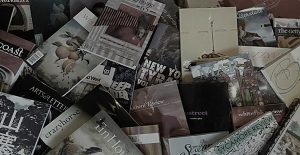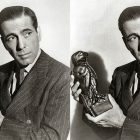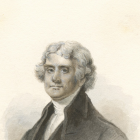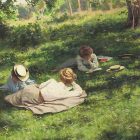The Best Short Story I Read in a Lit Mag This Week: “Freedom” by Rachel Cusk

Many of us in the States are fresh off of celebrating the 4th of July, and perhaps even at some point between parties spent time reflecting on the promise of Independence, as well as the reality. In “Freedom” (The Paris Review), Rachel Cusk explores the difficult task of attaining independence, both from the perspective of those who already have it and those who do not.
Cusk opens the story at a hair salon, the setting of the entire piece. The unnamed narrator has come to visit her stylist, Dale, in order to have her hair colored for the first time, as it is beginning to go gray. The conversation quickly turns philosophical, as Dale argues against the narrator coloring her hair.
“I get mine done,” [the other stylist] said. “A lot of people do.”
“We’re talking about a commitment,” Dale said. “You have to keep coming back every six weeks. That’s a life sentence,” he added darkly, his eyes meeting mine in the mirror. “I’m just saying you need to be sure.”
The other stylist looked at me sidelong with her sphinxlike smile.
“A lot of people don’t find that a problem,” she said. “Their lives are mostly commitments anyway. At least if it makes you feel good, that’s something.”
Here Cusk sets up notions of how commitments and freedom interplay with each other—a thematic interplay explored throughout the piece. Does the freedom from commitments make one happy, as opposed to a life filled with them? Or, paradoxically, both/neither?
Dale further complicates the discussion by—somewhat ironically, as he’s the stylist—suggesting that there’s more power in an appearance artificially unchanged, versus the latter.
“It doesn’t fool anyone, you know,” he said. “It just makes it obvious that you’ve got something to hide.”
I said that seemed preferable to having what you wished hidden on public display.
“Why?” Dale said. “What’s so terrible about looking like what you are?”
I didn’t know, I said, but it was obviously something a lot of people fear.
Cusk then interrupts the argument, which has turned towards the potential consequences of using one’s freedom, when a school age boy enters the salon, clearly under the command of his mother. Interesting to note that the boy is dressed in only, “a gray school shirt and trousers.” I’d argue that this minor detail begins to give the color a deeper thematic resonance, and not just when paired with the hair in question. Earlier, Cusk reveals that the weather is dark and stormy outside, and the rain “looked like ink running down a page.” These matters being discussed are far from black and white.
As the boy quietly succumbs to an unwanted haircut—“The boy looked at (his mother) with a pleading expression…His arms hung by his sides, the palms opened in protest”—the conversation continues further into the nature of freedom. Dale reveals that he had an evening commitment fall through, and that he was actually happy about it. He mentions that he’s found the freedoms that come with age (and its independence) can after a while themselves become confining.
“The thing is,” [Dale] said, “that kind of life—the parties, the drugs, the staying up all night—is basically repetitive. It doesn’t get you anywhere and it isn’t meant to, because what it represents is freedom.” He picked up the pink plastic dish and stirred its contents with the paintbrush. “And to stay free,” he said, coating the brush with the thick brown paste, “you have to reject change.”….
I said I wasn’t sure: when people freed themselves, they usually forced change on everyone else. But it didn’t necessarily follow that to stay free was to stay the same. In fact, the first thing people sometimes did with their freedom was to find another version of the thing that had imprisoned them. Not changing, in other words, deprived them of what they’d gone to such trouble to attain.
As the conversation becomes more and more lofty, Cusk uses it to create a dazzling irony when the other stylist, Sammy, pretends to make an unfortunate decision with the helpless boy’s hair.
[She] picked up her comb and made a neat parting down the middle. The boy looked immediately anxious and Sammy laughed.
“I’ll leave it like that, shall I?” she said, “Don’t panic, only joking. It’s just so that I can get it the same length on both sides. You don’t want to go around with your hair all different lengths, do you?”
The boy looked away again silently.
The boy doesn’t have a choice when it comes to his hair—and presumably, any of the other choices being discussed in the chair next to him. What a privilege these intellectual flights regarding how to use one’s freedom seem when contrasted with a boy helpless in the swivel chair.
After the adults in the salon continue musing over the complications of adult life, Cusk prepares for the ending by bringing forth a series of concrete visual images that at first appear to be a digression from the topic at hand, but soon, due in large part to the language, demand a more thematic reading.
By now it was completely dark outside. Inside the salon, all the lights were on. There was music playing, and the droning sound of passing traffic could be faintly heard from the street. There was a great bank of glass shelves against one wall where hair products stood for sale in pristine rows, and when a lorry passed outside, it shuddered slightly and the jars and bottles rattled in their places. The room had become a chamber of reflecting surfaces while the world outside became opaque. Everywhere you looked, there was only the reflection of what was already there. Often I had walked past the salon in the dark and had glanced in through the windows. From the darkness of the street, it was almost like a theater, with the characters moving around in the bright light of the stage.
All of these beautiful hair products, with their shining, reflective glass, are on a shelf that the boy can’t reach. I won’t give away the ending, but I will say that before the story is done, instead of the rain falling down the windows like ink down a page, it’s now—thanks to the boy—the multi-colored hair products, with all of their glory and promise, running across the floor.



